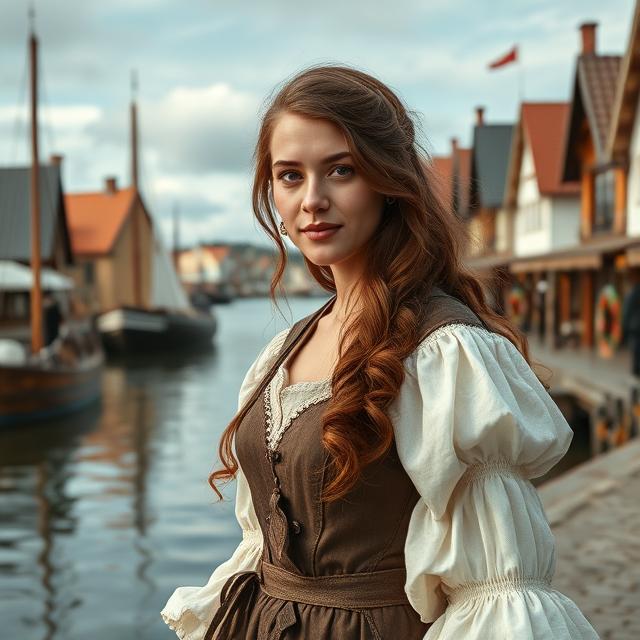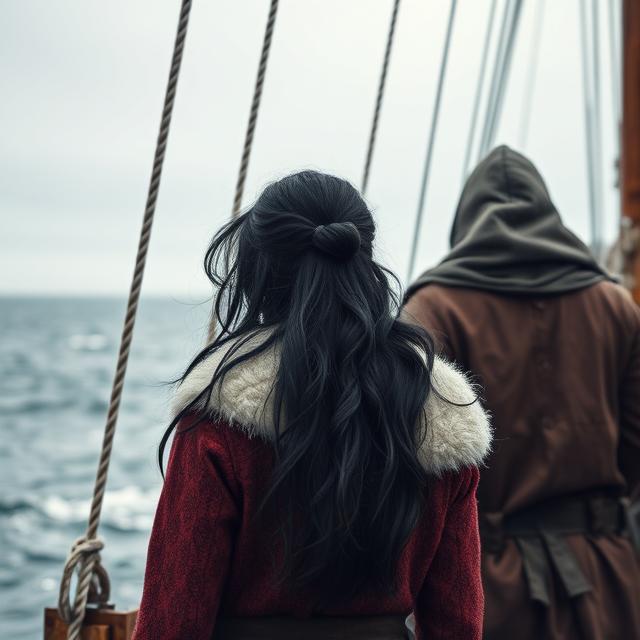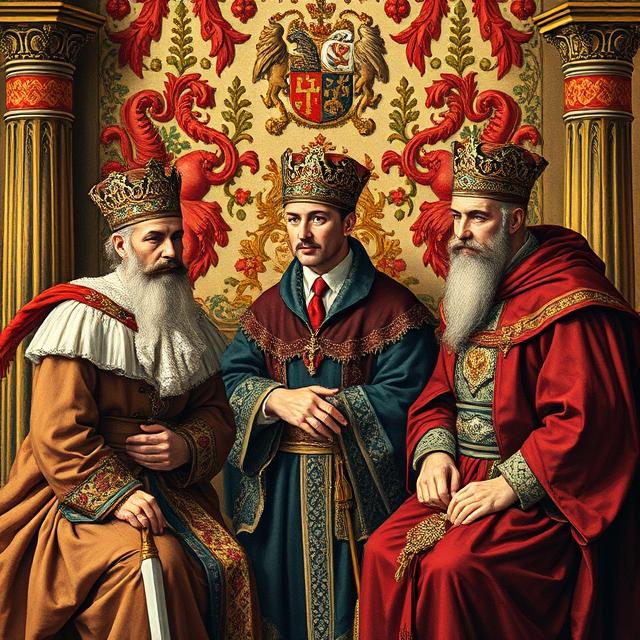You fold the letter carefully, tucking it into your coat, and ride north through frost-covered fields and dark forests. The Baltic stretches before you at last, gray and restless under the morning light. A sturdy vessel awaits at the coast, sails taut in the wind, ready to carry you to Sweden. You board without hesitation, the crow in your chest restless, wings brushing against your ribs, whispering of caution and memory.
Days pass at sea, waves churning beneath the hull, wind stinging your face. At last, Aldebryn emerges from the mist: cliffs rising from icy waters, streets winding upward from the harbor. You disembark, moving swiftly through narrow alleys to the estate she occupies.
She waits at the port, eyes wide, cautious. “You came,” she says softly.

“I came for the truth,” you reply.
She leads you inside. The hearth glows, but the warmth does nothing to settle the cold in your chest. “I was misled,” she begins, voice shaking. “I acted under Hyacint’s orders. I—”
“Did you know my parents were dead?” you interrupt, the weight of years pressing on your words.
Her face pales, and for a moment, silence hangs between you like steel. Then she nods slowly. “I knew,” she admits. “I could not save them, and I feared that acting would have cost you your life as well. I… I thought it was safer to remain quiet, to follow the path laid before me.”
You study her carefully. Her confession is honest, but it does not undo what was done. “You made choices,” you say, voice low but steady, “that allowed betrayal to reach its end. You left me to face it alone.”
“I was trapped,” she pleads, desperation flickering in her eyes. “I—”
“I understand,” you say softly, the anger fading into something older, deeper. “You were frightened. So was I. We were all children then—playing at loyalty in a world of knives.”
She steps closer, trembling. “Then… can you forgive me?”
For a moment, you cannot answer. The years between you weigh heavy—the laughter in summer fields, the whispered promises beneath stars, the tears on the day everything burned. You see her not as the conspirator of your pain, but as the last remnant of the life that once was.
Slowly, you reach out, brushing a strand of hair from her face. “I forgive you,” you whisper. “Not because the past can be undone, but because love endures where memory falters. It was love that bound us once, and it is love that will save what remains of us now.”
Her eyes glisten, and the breath she exhales sounds almost like a sob. She leans forward, pressing her forehead to your chest. For the first time in years, the crow within you is still.
When she lifts her gaze, there is resolve in it. “Then let me come with you,” she says. “If Moravice stands on the edge of ruin, I will not stand idle again. Let me make amends—not in words, but in deeds.”
You hesitate, torn between duty and the ghost of trust. Yet her voice carries no pleading now, only purpose. You nod. “Then come,” you say at last. “But understand—this road leads through fire. There may be no home at its end.”
“Then we will build one,” she answers simply.
Without another word, you turn toward the harbor, and she falls into step beside you. The ship waits, sails straining to catch the northern wind. The air is sharp with salt and frost, the sky pale with the first light of dawn.
You do not look back; there is nothing left behind you that has not already been burned or forgiven. The path ahead is uncertain, yet for the first time, you do not walk it alone.
The crow in your chest stirs—not in warning, but in uneasy peace—its wings brushing your ribs as if testing the shape of this new balance between love and duty. Justice and survival still call you northward, but now the weight of purpose is shared.
Margaret’s hand finds yours as you step aboard, her grip firm despite the cold. You breathe in the sea air, and though the wind still tastes of loss, it carries something else as well—something like hope, fragile but real.
Duty remains, vast and relentless. Yet beside you stands the one who once broke your heart and now helps to steady it, her presence no longer a wound but a quiet strength. The crow in your chest stirs, not in protest, but in recognition—of love that endures, reshaped by loss and tempered by resolve.
The ship slides into the gray Baltic, carrying you southward toward Moravice. Aldebryn fades behind you, its cliffs dissolving into mist. Ahead, the horizon widens—cold, uncertain, and full of promise. Margaret stands at your side, her cloak snapping in the wind, her gaze fixed where yours is fixed: home.

War approaches, and duty calls, yet love walks with you now—not as a distraction, but as a companion. There is no turning back, and no need to. Together, you face the storm.
Then, one day, the messengers come again. Their words chill your blood: Claudius offers peace. Not honor. Not equality. Not recognition of your freedom. Only vassalage — a formal subjugation, thinly gilded with courtesy. The city would survive, yes, but at the cost of its autonomy, its independence, its soul.
You call your council once more, the lords gathering around the polished oak of the hall. Their faces are weary, lined with both sweat and calculation. The room is thick with tension, as though the very air knows the weight of the decision.

“The Emperor offers peace,” you begin, your voice low, measured, yet carrying the urgency of truth. “It is not flattering. It is not equal. It is vassalage disguised as courtesy. Accept it, and Moravice survives, but it is no longer ours. Decline, and we risk all we have built — our lives, our people, our lands — in a war we cannot be certain to win.”
A murmur runs through the assembly. One lord shifts uneasily, his hand brushing the hilt of his dagger. “You know what he commands,” he says. “We cannot match his armies again. Our men are weary, our coffers nearly bare. The city will survive this year, perhaps another, but for how long?”
Another voice rises, quieter but sharper: “And what of honor, my lord? If we bend now, what signal do we send? To our neighbors, to our children? To the people who have bled for this land?”
Half the council leans toward caution, toward survival; the other half remain neutral, weighing the risk, uncertain of their loyalty when the moment of truth arrives. Only one stands firm — a young lord whose eyes still carry fire. “Freedom is the soul of Moravice,” he declares, voice unwavering. “We swore allegiance to you as our protector, not to the Emperor as our master. If war comes, I will ride at your side, and I will fight.”
You study the council, each face reflecting fragments of fear, ambition, and pragmatism. You hear again the echoes of your desert mantra — the lesson that truth is never singular, that mirrors are always broken. Each lord’s loyalty, each soldier’s courage, each citizen’s trust is a reflection of your choices. You are the center, but not the whole.
The question is laid bare before you: survive and compromise, or risk all for freedom. Accept the vassalage, and Moravice endures, but its spirit bends. Refuse, and the Emperor’s wrath will descend with certainty, and you cannot be sure even those who now sit with you will not falter.
You pace the hall, hands brushing against the stone walls, cold as the weight of your decision. Your mind flickers to the shard of black glass, to the signet, to every choice you have made since the dunes of your desert ride. All mirrors are broken, you recall, but now you understand: brokenness does not diminish truth. It reveals it in shards.
The room is silent. Even the wind outside the battlements seems to wait. You sense that whatever you choose, it will define not only the fate of Moravice, but your own understanding of courage, loyalty, and destiny.
You consider the path of compromise — vassalage, peace, security. It is safe. It preserves life. But your heart trembles at its cost: a city ruled, but not free; a people protected, but not sovereign.
You consider the path of defiance — open war, uncertainty, potential ruin. It is dangerous, perhaps fatal. But it carries the possibility of freedom, of truth unbound, of a legacy forged without chains.
The young lord watches you, unwavering. You see his reflection, a shard of clarity in a hall of fractured mirrors. One life, one choice, one spark.
And then you speak, not to the council, but to yourself: “To live fully is to embrace the shards of reality, to see the reflections of all who trust us, and to act in accordance with what our heart recognizes as truth.”
The lords lean forward. Some nod, some frown, some shift in the weight of their hesitance. The answer lies not in them alone, nor in the risk of battle, nor in the Emperor’s gaze. The answer lies in you — the keeper of Moravice, the heir of forefathers, the bearer of choice.
You feel the desert’s mantra echo, not as words, but as understanding: that destiny is not given, it is forged. That truth is not found, it is chosen. That even in the face of overwhelming power, one’s own path remains the only ground where courage can take root.
The council waits. The candles flicker, shadows leaping across maps of rivers and walls and faraway plains.
And you know: you must choose.
….
…..

2 Comments